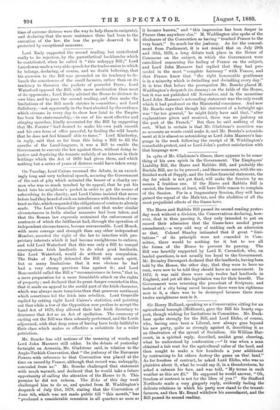Mr. Bourke has odd notions of the meaning of words,
and Lord John Manners still odder. In the debate of yesterday fortnight on Armenia, Mr. Gladstone said, in relation to the Anglo-Turkish Convention, that " the jealousy of the European Powers with reference to that Convention was placed at the time on record by France, although that record was, unhappily, concealed from us." Mr. Bourke challenged that statement with much warmth, and declared that he would take a future opportunity of calling the attention of the House to it. This promise he did not redeem. The Echo of this day week challenged him to do so, and quoted from M. Waddington's despatch of July 21st, 1878, stating that the Convention of June 4th, which was not made public till " this month," has "produced a considerable sensation in all quarters as soon as it became known," and "this impression has been deeper in France than anywhere else." M. Waddington also spoke of the disclosure of the Convention as having " touched France to the very heart." So much for the jealousy. As for the conceal- ment from Parliament, it is not denied that on July 29th and 30th, 1878, a long debate took place in the House of Commons on the subject, in which the Government were catechised concerning the feeling of France on the subject, and Lord John Manners had replied that they had pro- ceeded in the most " complete harmony " with France, and that France knew that " the right honourable gentleman is in a minority which is dwindling and dwindling every day?' It is true that before the prorogation Mr. Bourke placed M. Waddington's despatch (in dummy) on the table of the House, but it was not published till November, and in the meantime Lord John Manners's astounding statement was the only result which it had produced on the Ministerial conscience. And now Mr. Bourke says that though his statement of a fortnight ago was " far too general," he might fairly have said that, " after explanations given and received, there was no jealousy on the part of the French." But then he said nothing of the sort. What is certain is that Mr. Gladstone's assertion was as accurate as words could make it, and Mr. Bourke's astonish- ment at it is almost as astonishing as Lord John Manners's lan- guage in the week following the receipt of M. Waddington's remarkable protest, and as Lord John's perfect satisfaction with that language now.


































 Previous page
Previous page